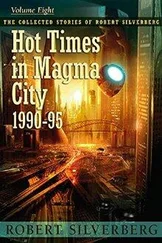Robert Silverberg - Breckenridge and the Continuum
Здесь есть возможность читать онлайн «Robert Silverberg - Breckenridge and the Continuum» весь текст электронной книги совершенно бесплатно (целиком полную версию без сокращений). В некоторых случаях можно слушать аудио, скачать через торрент в формате fb2 и присутствует краткое содержание. Год выпуска: 2009, ISBN: 2009, Издательство: Subterranean Press, Жанр: Фантастика и фэнтези, на английском языке. Описание произведения, (предисловие) а так же отзывы посетителей доступны на портале библиотеки ЛибКат.
- Название:Breckenridge and the Continuum
- Автор:
- Издательство:Subterranean Press
- Жанр:
- Год:2009
- ISBN:978-1-59606-212-2
- Рейтинг книги:3 / 5. Голосов: 1
-
Избранное:Добавить в избранное
- Отзывы:
-
Ваша оценка:
- 60
- 1
- 2
- 3
- 4
- 5
Breckenridge and the Continuum: краткое содержание, описание и аннотация
Предлагаем к чтению аннотацию, описание, краткое содержание или предисловие (зависит от того, что написал сам автор книги «Breckenridge and the Continuum»). Если вы не нашли необходимую информацию о книге — напишите в комментариях, мы постараемся отыскать её.
Breckenridge and the Continuum — читать онлайн бесплатно полную книгу (весь текст) целиком
Ниже представлен текст книги, разбитый по страницам. Система сохранения места последней прочитанной страницы, позволяет с удобством читать онлайн бесплатно книгу «Breckenridge and the Continuum», без необходимости каждый раз заново искать на чём Вы остановились. Поставьте закладку, и сможете в любой момент перейти на страницу, на которой закончили чтение.
Интервал:
Закладка:
“What are you singing?” Breckenridge asked.
“The hymn of Oedipus King of Thieves,” Scarp told him
Had it been such a bad life? He had been healthy, prosperous, and beloved. His father was managing partner of Falkner, Breckenridge & Company, one of the most stable of the Wall Street houses, and Breckenridge, after coming up through the ranks in the family tradition, putting in his time as a customer’s man and his time in the bond department and his time as a floor trader, was a partner too, only ten years out of Dartmouth. What was wrong with that? His draw in 1972 was $83,500—not as much as he had hoped for out of a partnership, but not bad, not bad at all, and next year might be much better. He had a wife and two children, an apartment on East 73rd Street, a country cabin on Candlewood Lake, a fair-size schooner that he kept in the Gulf Coast marina, and a handsome young mistress in an apartment of her own on the Upper West Side. What was wrong with that? When he burst through the fabric of the continuum and found himself in an unimaginably altered world at the end of time, he was astonished not that such a thing might happen but that it had happened to someone as settled and well established as himself.
While they slept, a corona of golden light sprang into being along the top of the city wall; the glow awakened Breckenridge, and he sat up quickly, thinking that the city was on fire. But the light seemed cool and supple, and appeared to be propagated in easy rippling waves, more like the aurora than like the raw blaze of flames. It sprang from the very rim of the wall and leaped high, casting blurred, rounded shadows at cross-angles to the sharp crisp shadows that the fragmented moon created. There seemed also to be a deep segment of blackness in the side of the wall; looking closely, Breckenridge saw that the huge gate on the wall’s western face was standing open. Without telling the others he left the camp and crossed the flat sandy wasteland, coming to the gate after a brisk march of about an hour. Nothing prevented him from entering. Just within the wall was a wide cobbled plaza, and beyond that stretched broad avenues lined with buildings of a strange sort, rounded and rubbery, porous of texture, all humps and parapets. Black unfenced wells at the centre of each major intersection plunged to infinite depths. Breckenridge had been told that the city was empty, that it had been uninhabited for centuries since the spoiling of the climate in this part of the world, so he was surprised to find it occupied; pale figures flitted silently about, moving like wraiths, as though there were empty space between their feet and the pavement. He approached one and another and a third, but when he tried to speak no words would leave his lips. He seized one of the city dwellers by the wrist, a slender black-haired girl in a soft gray robe, and held her tightly, hoping that contact would lead to contact. Her dark somber eyes studied him without show of fear and she made no effort to break away. I am Noel Breckenridge, he said—Noel III—and I was born in the town of Greenwich, Connecticut in the year of our lord 1940, my wife’s name is Merry and my daughter is Cassandra and my son is Noel Breckenridge IV, and I am not as coarse or stupid as you may think me to be. She made no reply and showed no change of expression. He asked, Can you understand anything I’m saying to you? Her face remained totally blank. He asked, Can you even hear the sound of my voice? There was no response. He went on: What is your name? What is this city called? When was it abandoned? What year is this on any calendar that I can comprehend? What do you know about me that I need to know? She continued to regard him in an altogether neutral way. He pulled her against his body and gripped her thin shoulders with his fingertips and kissed her urgently, forcing his tongue between her teeth. An instant later he found himself sprawled not far from the campsite with his face in the sand and sand in his mouth. Only a dream, he thought wearily, only a dream.
He was having lunch with Harry Munsey at the Merchants and Shippers Club: sleek chrome-and-redwood premises, sixty stories above William Street in the heart of the financial district. Subdued light fixtures glowed like pulsing red suns; waiters moved past the tables like silent moons. The club was over a century old, although the skyscraper in which it occupied a penthouse suite had been erected only in 1968—its fourth home, or maybe its fifth. Membership was limited to white male Christians, sober and responsible, who had important positions in the New York securities industry. There was nothing in the club’s written constitution that explicitly limited its membership to white male Christians, but all the same there had never been any members who had not been white, male, and Christian. No one with a firm grasp of reality thought there ever would be.
Harry Munsey, like Noel Breckenridge, was white, male, and Christian. They had gone to Dartmouth together and they had entered Wall Street together, Breckenridge going into his family’s firm and Munsey into his, and they had lunch together almost every day and saw each other almost every Saturday night, and each had slept with the other’s wife, though each believed that the other knew nothing about that.
On the third martini Munsey said, “What’s bugging you today, Noel?”
A dozen years ago Munsey had been an all-Ivy halfback; he was a big, powerful man, bigger even than Breckenridge, who was not a small man. Munsey’s face was pink and unlined and his eyes were alive and youthful, but he had lost all his hair before he turned thirty.
“Is something bugging me?”
“Something’s bugging you, yes. Why else would you look so uptight after you’ve had two and a half martinis?”
Breckenridge had found it difficult to grow used to the sight of the massive bright dome that was Munsey’s skull.
He said, “All right. So I’m bugged.”
“Want to talk about it?”
“No.”
“Okay,” Munsey said.
Breckenridge finished his drink. “As a matter of fact, I’m oppressed by a sophomoric sense of the meaninglessness of life, if you have to know.”
“Really?”
“Really.”
“The meaninglessness of life?”
“Life is empty, dumb, and mechanical,” Breckenridge said.
“Your life?”
“Life.”
“I know a lot of people who’d like to live your life. They’d trade with you, even up, asset for asset, liability for liability, life for life.”
Breckenridge shook his head. “They’re fools, then.”
“It’s that bad?”
“It all seems so pointless, Harry. Everything. We have a good time and con ourselves into thinking it means something. But what is there, actually? The pursuit of money? I have enough money. After a certain point it’s just a game. French restaurants? Trips to Europe? Drinking? Sex? Swimming pools? Jesus! We’re born, we grow up, we do a lot of stuff, we grow old, we die. Is that all? Jesus, Harry, is that all?”
Munsey looked embarrassed. “Well, there’s family,” he suggested. “Marriage, fatherhood, knowing that you’re linking yourself into the great chain of life. Bringing forth a new generation. Transmitting your ideas, your standards, your traditions, everything that distinguishes us from the apes we used to be. Doesn’t that count?”
Shrugging, Breckenridge said, “All right. Having kids, you say. We bring them into the world, we wipe their noses, we teach them to be little men and women, we send them to the right schools and get them into the right clubs, and they grow up to be carbon copies of their parents, lawyers or brokers or clubwomen or whatever—”
The lights fluttering. The aurora: red, green, violet, red, green. The straining fabric—the moon, the broken moon—the aurora—the lights—the fire atop the walls—
Читать дальшеИнтервал:
Закладка:
Похожие книги на «Breckenridge and the Continuum»
Представляем Вашему вниманию похожие книги на «Breckenridge and the Continuum» списком для выбора. Мы отобрали схожую по названию и смыслу литературу в надежде предоставить читателям больше вариантов отыскать новые, интересные, ещё непрочитанные произведения.
Обсуждение, отзывы о книге «Breckenridge and the Continuum» и просто собственные мнения читателей. Оставьте ваши комментарии, напишите, что Вы думаете о произведении, его смысле или главных героях. Укажите что конкретно понравилось, а что нет, и почему Вы так считаете.












